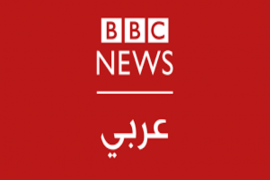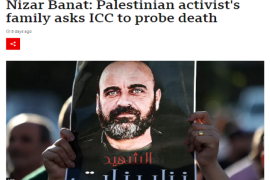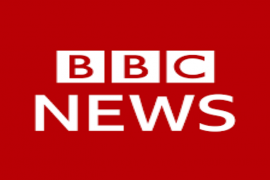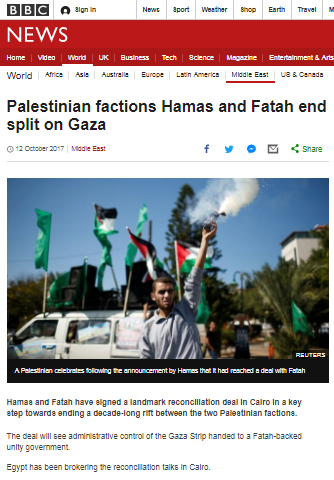The news, on February 10th, that Israel’s Magen David Adom ambulance service had vaccinated some Palestinian workers against Coronavirus appeared to have prompted an item in the February 11th evening edition of the BBC World Service radio programme ‘Newshour’. That programme’s synopsis read:
“Also in the programme: Israel begins vaccinating small numbers of Palestinians who enter the country to work…”
However listeners soon discovered that that news was merely a hook for yet more promotion of the political campaign that exploits the topic of Corona vaccinations to which the BBC self-conscripted over a month ago.
Presenter Julian Worricker introduced the item (from 30:04 here): [emphasis in italics in the original, emphasis in bold added]
Worricker: “Israel continues to have the highest rate of Covid-19 vaccinations per person [sic] in the world. But that’s in stark contrast to the situation in the occupied West Bank and in neighbouring Gaza. Pressure has been growing on the Israeli government to provide what the UN describe as equitable access to vaccines. And now, Israeli paramedics have started vaccinating small numbers of Palestinians who travel across checkpoints to work in Israel. It’s the first time jabs have been offered to people from the West Bank beyond several thousand health workers and prisoners.”
As regular readers are no doubt aware, the BBC’s editorial guidelines on impartiality state that:
“4.3.12 We should not automatically assume that contributors from other organisations (such as academics, journalists, researchers and representatives of charities and think-tanks) are unbiased. Appropriate information about their affiliations, funding and particular viewpoints should be made available to the audience, when relevant to the context.”
Worricker however completely ignored those guidelines when introducing his sole interviewee:
Worricker: “Aisha Mansour is the West Bank director for Medical Aid for Palestinians. I asked her what she made of this move by the Israelis.”
Listeners were told nothing of the “funding and particular viewpoints” of Medical Aid for Palestinians (MAP), including the fact that last March Aisha Mansour collaborated with anti-Israel political groups exploiting the Coronavirus pandemic for the promotion of a campaign demanding an end to the counter-terrorism measures imposed on the Gaza Strip.
Neither were BBC audiences informed of the fact that last month MAP joined the political campaign that exploits the topic of vaccines (to which the BBC has given considerable amplification) or that it is currently promoting a petition in the UK to pressure “Foreign Secretary Dominic Raab to urgently press Israel to uphold its duty to ensure rapid, equitable and comprehensive access to COVID-19 vaccines for the Palestinian people”.
While such information would clearly have helped listeners put Aisha Mansour’s politically motivated talking points into better perspective, it was denied to audiences in breach of the BBC’s own guidelines.
Mansour: “It’s not sufficient just to vaccinate Palestinians who are going inside to work. Israel has an obligation as an occupying power to ensure that all Palestinians in the occupied territories have equitable access to the vaccine. That includes all 5 million people living in the West Bank and Gaza.”
Neither did listeners hear about the relevant section of the Oslo Accords concerning health in the BBC’s own words. Instead – referring to an interview already discussed here – Worricker framed those agreements as something that ‘Israel says’.
Worricker: “The Israeli view of course is different. The health minister told the BBC we can also look into the so-called [sic] Oslo agreements where it says loud and clear that the Palestinians have to take care of their own health.
Mansour: “Yes, according to international human rights law, the occupying power is the responsible entity to ensure that the people living under occupation have access to the necessary healthcare including during pandemics and for vaccines. A recent UN human rights expert found that the Oslo Accords do not exempt Israel from the responsibilities as an occupying authority.”
Worricker made no effort to clarify to listeners that the “UN human rights expert” cited by Mansour is in fact two UN special rapporteurs for the notoriously anti-Israel UN Human Rights Council, one of whom has an obviously relevant anti-Israel record.
Worricker: “So your argument is that Israel should have done a good deal more for the Palestinians up till now.”
Mansour: “Oh yes.”
Worricker: “How much more? How serious is the situation of the Coronavirus in the West Bank and Gaza just now?”
Mansour: “A month ago there is a major peak and hospitals were overwhelmed and ICUs were overwhelmed. It decreased a little bit but the numbers continue to remain relatively steady at 200 to 300 per day and just over the last week we’re starting to see another peak. So I mean the issue remains, the pandemic remains and there are several hundred new cases each day as well as people in the ICU and we’re monitoring the situation because there are peaks along the way. Ensuring that we have access to the vaccines is critical to be able to control the pandemic.”
Apparently forgetting that his interviewee ostensibly represents a UK charity, Worricker went on:
Worricker: “How are your health services coping?”
Mansour: “It’s been difficult. It’s been a difficult year for the Palestinian health system. The Palestinian health system in the West Bank and Gaza has already been troubling prior to the pandemic. I mean we’ve been living under military occupation for over 50 years. Gaza’s been living with a blockade for over 10 years. And this has really impacted and weakened the healthcare system and the infrastructure. So bringing Covid and having the pandemic has put additional stresses on the healthcare system which was already weak and had a weak infrastructure.”
Worricker: “The ministry of health does have the power – doesn’t it? – to do deals with companies to bring vaccines into the region. Indeed there are reports that they are doing deals with four such companies. Should they have acted more quickly?”
Mansour: “They have been acting and they’ve been…it’s a matter of…really it’s a matter of resources and availability and…ahm…and so the Palestinian Authority has managed to obtain limited, very limited number of vaccines up to this period but from the very beginning they’ve been working to achieve them and also with the WHO with the technical support and advisors to bring in the vaccine. But to this point, given the current situation of the health system, the limited resources, very little vaccines have entered the country [sic] to this point.”
Worricker ended by putting words into his interviewee’s mouth:
Worricker: “Presumably your wider argument would be that it benefits everybody if the vaccines help those in the West Bank and Gaza because the numbers of people who move from one region to another where you are is significant: more than 100,000 Palestinians go into Israel each day to work. You would argue, presumably, that it helps everybody if the vaccine is as widely administered as possible.”
Mansour: “Of course. There’s a need for everyone to be vaccinated to ensure that everyone is safe. Israel’s been vaccinating its population including the settlers who live in the West Bank while Palestinians living right next to these settlements in their villages are not being vaccinated. So it’s very important for everyone to have the access to be vaccinated, absolutely.”
Worricker: “Aisha Mansour, West Bank director for Medical Aid for Palestinians.”
Once again we see that the BBC – and ‘Newshour’ in particular – completely ignored the corporation’s own editorial guidelines on impartiality in order to provide an unchallenging platform for a representative of a political NGOs involved in an opportunistic anti-Israel campaign. Moreover, MAP subsequently used that interview to promote its related petition on social media, thereby illustrating the symbiotic relationship between political NGOs and the BBC.
Related Articles:
THE PARTIAL SOURCES BEHIND ANDREW MARR’S BBC ONE TALKING POINTS
BBC WS RADIO IGNORES EDITORIAL GUIDELINES IN YET ANOTHER VACCINATIONS ITEM






Worricker should have also interviewed an Israeli politician who could explain the Israeli logic and legality for their vaccine policy – but that is not in the DNA of the BBC. Meanwhile, Israel must ensure that the PA terrorists are in good health so that they can continue doing their job well.